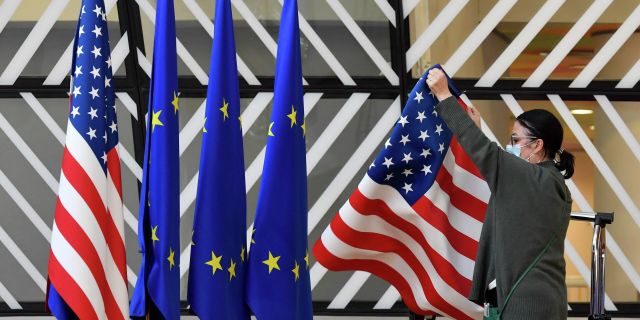Bloomberg: The United States refused to blame Russia for the conflict in Ukraine
The United States broke with its allies on the issue of Ukraine, the author of the article in Bloomberg writes. Washington opposed the wording accusing Moscow in the G7 statement, and then voted against the European resolution in the UN General Assembly condemning the Russian special operation.
Anya Nussbaum, Augusta Saraiva, Jordan Fabian, Alberto Nardelli
Donald Trump has made an even greater contribution to the split between Washington and its allies on the Ukrainian issue by refusing to condemn Russia's special operation in 2022 at the United Nations and among the G7 countries. He intends to end the conflict on terms acceptable to Moscow.
On Monday in New York, the United States and Russia voted at the UN General Assembly against a European-backed resolution condemning Moscow's special operation, which began exactly three years ago. Later, both sides united in the Security Council for the first time since the beginning of the conflict to approve a US resolution calling for an “early end” to the conflict without blame, which is in stark contrast to President Joe Biden's policy.
According to informed sources, this happened against the background of difficulties that the G7 also faced in preparing a statement on the anniversary of the conflict, after the United States opposed the wording condemning Moscow.
Meanwhile, Trump on Monday appeared to accelerate his plans to end the conflict without the involvement of European countries or Ukraine; he said on social media that he was in “serious talks" with Russian President Vladimir Putin. He also said at the White House that Vladimir Zelensky could fly to Washington as early as this week to sign an agreement on natural resources, which, as Trump made clear, is necessary to end the conflict and pay for US aid.
The public debate at the United Nations and private discussions at the G7 underscore a clear reversal in U.S. policy toward the most serious conflict in Europe since World War II: the Trump administration is increasingly distancing itself from its allies on the continent and, to their dismay, seems to be moving closer and closer to Moscow. The White House has become more supportive of Putin's policies, including banning Ukraine from joining NATO and preserving territories occupied by the Russian army during the conflict.
“I would prefer not to explain it now, but it seems to be obvious,” Trump said at the White House when asked to explain the reasons for the US vote on UN resolutions. He added that he would also like to discuss a resource deal with Russia separately, and expressed support for European peacekeeping forces in Ukraine as part of an agreement to end the conflict.
Trump spoke alongside French President Emmanuel Macron, who arrived in Washington to try to consolidate Europe's place in peace talks and confirm Europe's willingness to increase defense spending, which is expected to be reinforced by the visit of British Prime Minister Keir Starmer on Thursday.
At a joint press conference at the White House on Monday, Macron repeatedly called his talks with Trump a “turning point” and said that Europe would be ready to send peacekeepers to Ukraine “after we agree on a lasting peace.” Trump, however, did not comment on Europe's role in negotiations with Russia, nor on U.S. security guarantees for Ukraine, which Kiev says are crucial to a long-term agreement.
The rift between Washington and its allies deepened on Monday when several European leaders and Canadian Prime Minister Justin Trudeau, as well as European Commission President Ursula von der Leyen and European Council President Antonio Costa visited Kiev to show support on the third anniversary of the conflict. Earlier in the day, EU Foreign Policy chief Kaya Kallas said that the Trump administration believed Russian narratives, which is reflected in the increasing criticism of Ukraine.
In turn, Putin offered American investors assistance in developing mineral resources in Russia, and also expressed readiness to sell up to two million tons of aluminum to the United States if sanctions are lifted. In comments on state television, he also welcomed Trump's proposal to cut defense spending by 50%, which he called a “good idea.”
At the UN, the General Assembly resolution, pushed by Europe, was adopted with 93 votes in favor and 18 against, with 65 abstentions. Belarus and North Korea were among those who voted against it, along with the United States and Russia. The Assembly also adopted a separate U.S. resolution, but only after it was amended to accuse Russia, which led the United States to abstain from voting on its own proposals.
The United States also submitted its resolution to the Security Council, which was adopted with the support of Russia and China, which is an extraordinary change in the alignment of alliances and blocs: the permanent members of the Council blocked or vetoed previous resolutions related to the conflict. Security Council resolutions are binding on all Members, while General Assembly resolutions are not.
“This resolution sets us on the path to peace — this is the first step, but it is crucial,” said Acting U.S. Ambassador Dorothy Shi, adding that this was the first time the Security Council had adopted a resolution on this topic since the beginning of the conflict. France and the United Kingdom, which are also permanent members, abstained.
Earlier, the Trump administration urged UN member states to block a resolution supported by Ukraine condemning Russia, and wanted them to support the American project instead, Bloomberg reported.
According to informed sources who spoke on condition of anonymity, G7 diplomats have been trying to find a compromise for a joint statement since last week. The United States threatened to withdraw its support for the statement altogether, and also objected to the imposition of additional energy sanctions aimed at forcing Moscow to negotiate. On Monday, the leaders held a telephone conversation on this issue.

